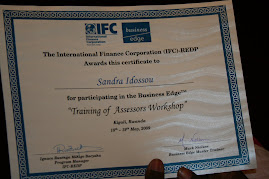
Companies are often recognised as a group of different agents that have a relationship with shareholders, suppliers, citizens, competitors, customers and the community as a whole. Even though companies are created primarily to make profit, they are also required to be an integral part of the development of the community.
While meeting a potential sponsor of the next issue of The ServiceMag, we had a very interesting debate on this issue of corporate social responsibility. Though we found this person’s arguments relevant; we needed him to understand the concept of the magazine as an educational tool in developing the business community here in Rwanda.
At this point, I must acknowledge that our arguments paid off as the new issue of the magazine will be out on Wednesday September 30th 2010.
The World Business Council for Sustainable Development (WBCSD) defines Corporate Social Responsibility (also known as CSR) as “the commitment of the company to contribute to the sustained economic development by working with employees, their families, the local community and the entire society in order to improve life quality”.
This definition simply indicates that companies are also responsible for the social, economic, cultural and even political aspects of our community. It is no secret that the values of a good company go beyond its staff or customers’ satisfaction but also to a large extent on its contribution towards the development of the entire community.
In Rwanda, we see certain organizations here and there making donations to orphans once in a while. Can we describe this as part of corporate social responsibility? Yes…. Is this enough?
Maybe, maybe not.
We discussed this issue with some friends and they think that the frequent donations (most at times simple commodities such as sugar, oil, foodstuff etc) are rather a way for many companies to offer themselves some free publicity through the media.
Examples were given of companies that organise for television coverage while they are at Umuganda (mandatory communal work activities undertaken every last Saturday of the month).
Well, I have also seen television coverage of companies digging ditches, sweeping roads or compounds or making compost. There are also those who build houses, clear the terrain, pay school fees or simply engage in any other activity that helps develop the country and its population.
At this point, a question emerges in my mind: do these companies or their top management have any responsibility, obligation or commitment concerning the population?
The answer is definitely yes. Every company, big or small, has a responsibility in creating and developing values such as protection, sustainability and acting responsibly and economically in offering a better economic environment to the public at large.
Corporate social responsibility in other parts of the world has become such an important issue and a real competitive differentiator. It is time this became a reality in Rwanda.
It is time the business community understood its role of impacting on everything that can contribute in developing the economic environment.
I believe that the eight Millenium Development Goals, (MDG’s), do not solely rely on our governments but also on everyone and other organizations. Educating, eradicating extreme poverty, reducing child mortality rates, fighting disease epidemics such as AIDS etc;;; are all goals that should be embraced by the business community.
Let’s all be responsible and participate in improving the lives of people in our communities. I would like to take this opportunity to thank once again all the companies that sponsor not only The ServiceMag but also the other events in town (culture, sports, fashion, arts, health, dance, educational, etc) .
I am convinced that if business owners in Rwanda integrate CSR into their strategies and daily operations, this will go a long way in creating a good reputation for their businesses and promoting the development of the country as a whole.
The Author is a customer service consultant working in Rwanda
.bmp)








































